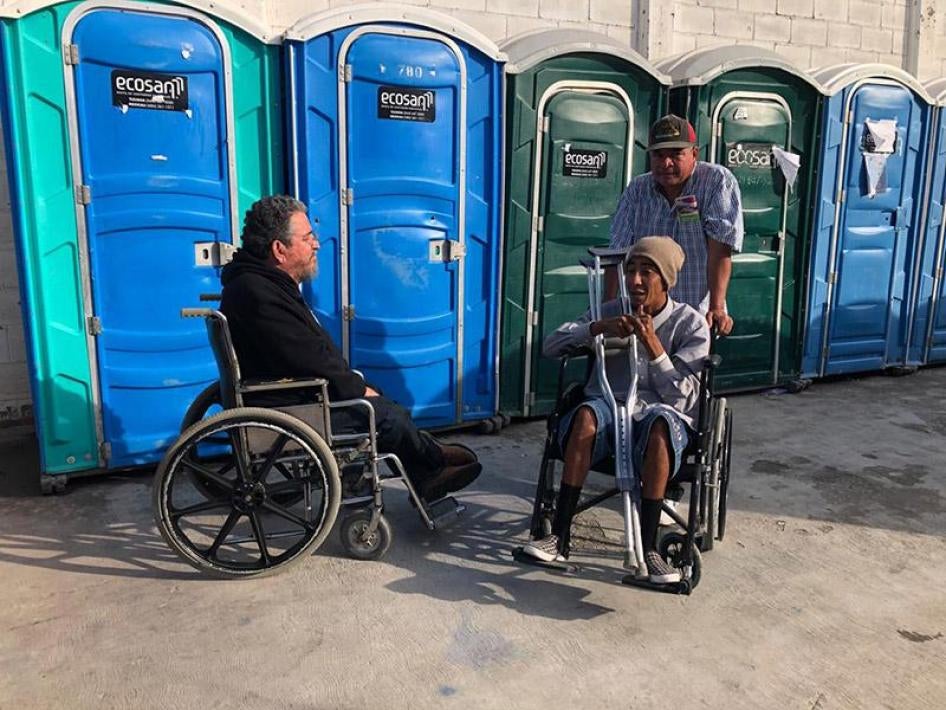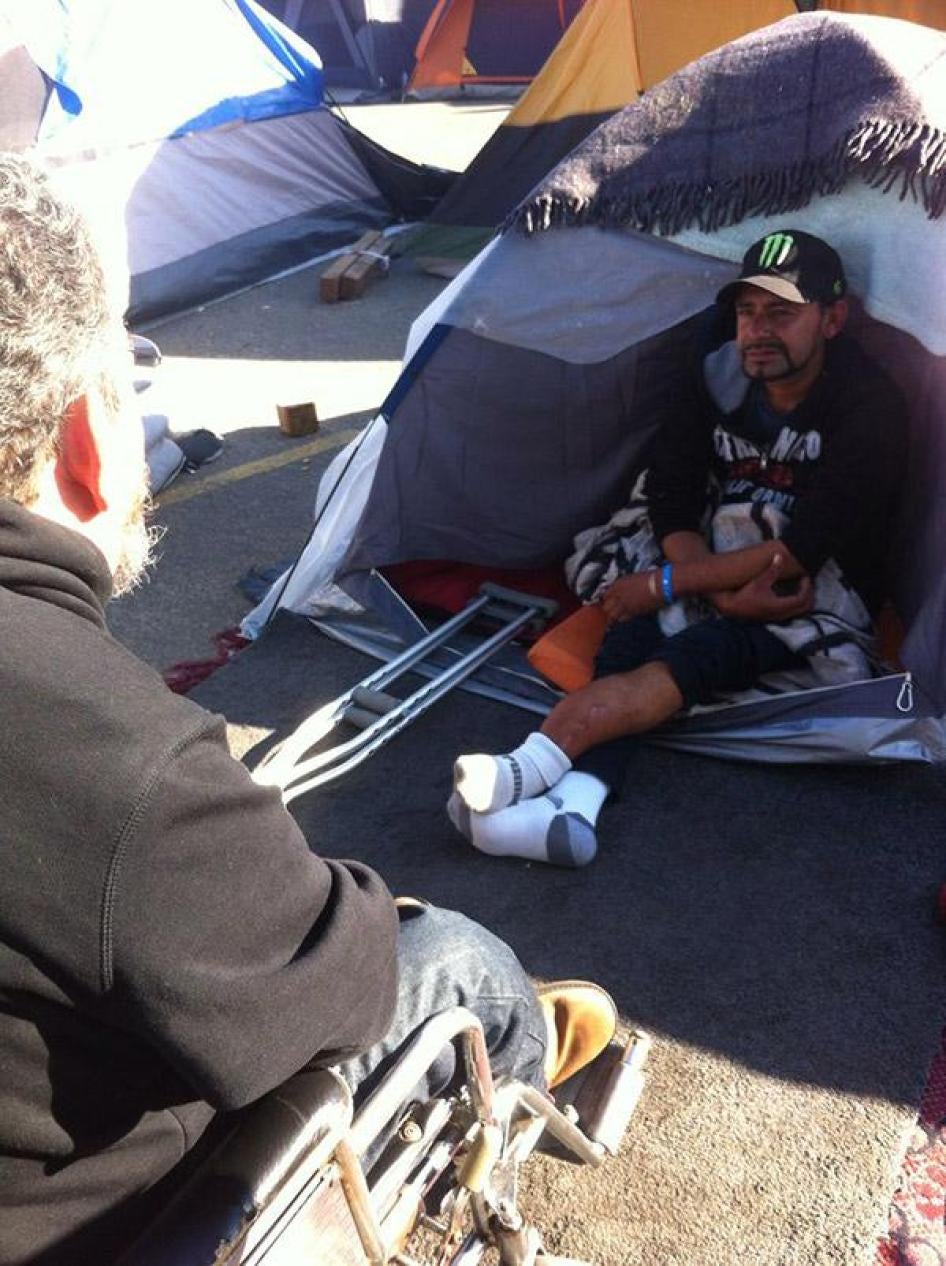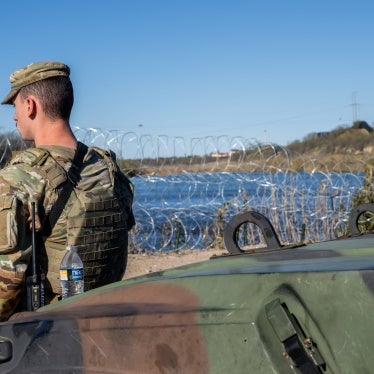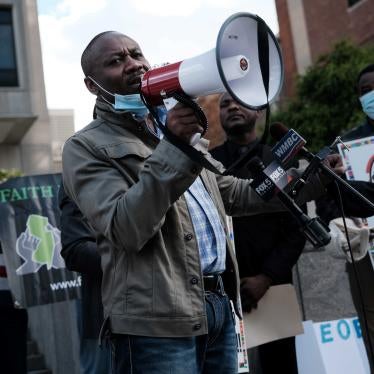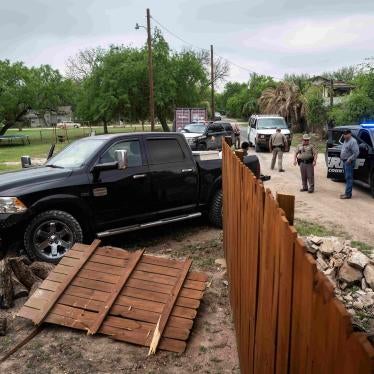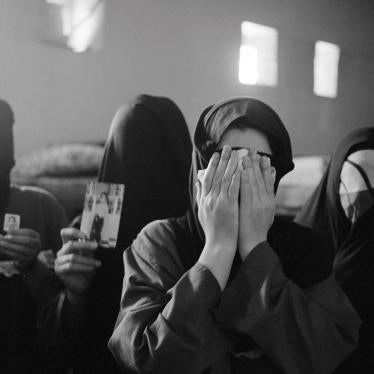In order to use the bathroom in the Tijuana migrant shelter, I had to be carried up a flight of stairs. Living in Latin America with a disability has never been a simple task; daily activities can be extremely difficult due to the lack of accessibility and specific supports for living independently. As a wheelchair user living in Mexico City, I had to be carried down two big stairs to be able to board my plane to get from the capital to Tijuana.
But things are much worse for the nine people with disabilities I met who traveled from different parts of Central America and Mexico to the US border as part of the migrant caravans. In November, their journey north in search of a life without violence and discrimination had stopped at El Barretal shelter in Tijuana, a town by the US border. Those who spoke with me were among the 12 migrants with disabilities registered by the Baja California state Human Rights Commission and other agencies. But the number is surely an understatement; people who may have less visible disabilities, such as developmental disabilities like autism or psychosocial disabilities (mental health conditions), were not identified.
When I asked about migrants with disabilities, many representatives from international humanitarian agencies reacted with surprise and immediately acknowledged the need to more actively search for them.
Violence and discrimination against people with disabilities in Central America
The stories of people with disabilities I met in the migrant caravan, although diverse, share common features. Most significant among these are experiences of violence and discrimination in the countries they’ve fled. But people with disabilities often experience other types of violence and discrimination that in some cases are intimately tied to their condition.
According to the Committee on the Rights of People with Disabilities, a UN expert body that examines whether states are upholding the rights of people with disabilities, in Honduras, people with disabilities are threatened and extorted by the Maras and other criminal gangs. In the case of Guatemala, the Committee found that discrimination against people with disabilities in Guatemala is systematic and many of them are frequently victims of exploitation, violence, and abuse and that there are no measures for their protection, recovery, and reparation.
María and Ximena (not their real names) are two deaf women who arrived in Tijuana from Honduras. Like many other members of the caravans, they came to Tijuana by asking for bus rides and sometimes walking part of the way. Maria could communicate easily in sign language. A special education teacher from Guatemala, who also fled Guatemala as part of the caravan, helps interpret for the two women.
“I came with the caravan because there is no work in my country, and there is a lot of discrimination against deaf people, like me, in Honduras,” María said. “I worked in a maquiladora making lingerie, but when they realized that I was deaf, they began to pay me less money. They paid me 1,000 lempiras (US$41) a week, while the others earned up to three times more.” Also, her co-workers bullied her. “Everyone closed the door to me,” she said. “One day, I proposed to my friend Ximena that we leave with the caravan, and since then we have been on the road.”
Ximena's story was different and involves domestic violence. In sign language she told me, “My husband, who is also deaf, once hit my head against the wall.” She had to leave her five-year-old daughter behind. Unlike Maria, Ximena does not use sign language very well and had much less access to education. She cannot read and write. “If I go back to Honduras, my husband is going to kill me,” she said.
I also met Daniel Humberto Folgar Navas, a 49-year-old man from Guatemala with osteogenesis imperfecta, a condition that causes his bones to break easily. “I have fractured my bones nine times, and I live with unbearably intense pain,” he told me. “In Guatemala, I do not have any disability benefits or social security, and although I am a school teacher, the only work I have been able to obtain is selling plastic bags in the market.”
Rafael Peralta has clubfoot. He left his country because he said that “as a disabled person, I have no hope; in Honduras disabled people don’t matter at all.”
He also experienced discrimination at work. “I worked in the fields doing agriculture, but I was paid just 400 lempiras (US$16) per week, while people without disabilities earn 1,200 (US$49) doing the same job. They made fun of me because of my physical disability.”
Traveling 3,000 miles with a disability
Getting to Tijuana from Honduras, Guatemala, or El Salvador means traveling more than 3,000 miles and passing through different cities and towns. It’s a difficult endeavor for anyone. Most people with disabilities I interviewed said the people they met along the way were generally supportive, although social attitudes towards their disabilities sometimes placed them at risk, and they had experienced some dangerous and difficult moments.
Ximena and Maria both had guns pointed at them because they could not hear warnings. “Once, going through Guatemala, we had to relieve ourselves. We tried to do it in an open field because there were no bathrooms. Some men pointed their guns at us because we didn’t pay attention to their warnings to stay away…. When they understood that we were deaf, they let us go.”
For Rafael, there were moments of real anxiety. He told me, “Due to my clubfoot, I walk slower and to keep the pace with others in the caravan, I could not stop to drink water very often. In Chiapas, Mexico, I became dehydrated and my stomach began to hurt intensely, I could hardly urinate.” The walk demanded a lot of effort from Rafael, who walked with a cane. “Fortunately, in Oaxaca the Red Cross gave me some crutches and with those I continued my trip. They also gave me a wheelchair that I now use.”
In Tijuana, I had the opportunity to meet an older person with a disability who had been victimized by criminal gangs on the road. Gustavo Martinez, 68, who walks with a cane due to a knee injury, fled violence in his local community of San Pedro Sula, Honduras, together with his 25-year-old granddaughter. Unlike other migrants in the caravan, Martínez managed to save some money before setting out to pay for bus tickets. He said when they got off the train at the wrong stop, a gang of men with assault weapons stopped them. “They hung me by my ankles, and they pulled out one of my toenails, trying to force me tell them if I had relatives in the United States. They intended to extort money from us, but nobody said anything, and they released us.”
Living conditions in shelters for migrants
Life in shelters in Tijuana is harsh for people with disabilities. When the migrant caravan first arrived, people were placed in a sports stadium called Benito Juarez. Heavy rains in November flooded the camp and the local authorities moved people to an area called El Barretal. Although most of the Central American migrants from the caravans are there now, about 300 people remained near Benito Juarez until December 12, 2018. Juan Carlos Flores, member of Baja California Human Rights Commission, said that they refused to move to El Barretal due to its location, a 45-minute drive from the US border crossing. They wanted to stay near the border in case their names were called for the asylum petition.
In Benito Juarez, I interviewed two people with physical disabilities: Ramiro Carrera and Herbert Ramos, both from Guatemala. Ramiro has difficulty walking and Herbert has no mobility in his right arm. “In this place there is no bathroom and we have to use one that is two streets away from here. We are charged five pesos (26 US cents) each time we use it,” said Herbert. For Ramiro that meant getting pushed in his wheelchair to the bathroom by someone.
While El Barretal provides migrants with slightly better facilities, people with disabilities still face numerous challenges. “I cannot bathe every day because it's very difficult, I do it outside, but the bathroom costs 25 Mexican pesos (US$ 1.24) and it's difficult to get money,” Daniel Folgar, who uses crutches, said. “Although the authorities serve food twice a day, people have to stand a long time in line,” Folgar explained. “With crutches it's hard, I cannot carry the plate of food they give me. Although I get priority and many times others bring me food here, but not always. If I stand in line, I risk getting bumped by others and falling down.”
Rafael Peralta, who also uses crutches, talked about the challenges he faces accessing showers and a toilet. Selling cigarettes in the camp, he manages to earn some money to shower in a neighboring private bathroom from time to time. “It is very difficult to bathe in this place; sometimes I spend four or five days without bathing, until I manage to save some money.”
When Rafael took me to El Barretal showers and bathrooms, I was able to see the difficulties he was talking about. The latrines were dirty and had a horrible stench. There were puddles of water in the entrances. “If I try to enter the latrine with the crutches I can slip; that's why I prefer to use a plastic can to go to the bathroom,” said Rafael. Entering with a wheelchair would indeed be impossible.
The United States government might take a long time to process asylum petitions that are still pending. More so because of the US government’s announcement on December 20 that “individuals arriving in the United States from Mexico – illegally or without proper documentation – will be returned to Mexico for the duration of their immigration proceedings.” Before the arrival of the caravans, there was already a significant backlog managing the requests. For the time being, the Mexican government should implement a specific program to meet the requirements of people with disabilities who are in El Barretal. That could include the provision of an accessible latrine, and the appointment of support staff so that these people can perform personal hygiene and are provided with food in a safe manner.

